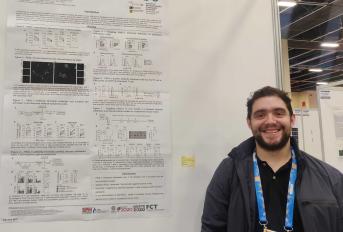Associação Portuguesa de Investigação em Cancro
Discovery of a new immunotherapeutic target against B-lymphocyte lymphoma
Discovery of a new immunotherapeutic target against B-lymphocyte lymphoma

João L. Pereira1,2,3, Liliana Arede1, Francisca Ferreira1,2,4, Andreia Matos1,5,6,7,8, Dulcineia Pereira1,2,9, Rita F. Santos1,10,11, Alexandre M. Carmo1,10, Maria J. Oliveira1,3,5, José C. Machado1,2,3, Delfim Duarte1,3,9, Nuno R. dos Santos1,2
1 i3S - Instituto de Investigação e Inovação em Saúde, Universidade do Porto, Porto, Portugal.
2 IPATIMUP - Institute of Molecular Pathology and Immunology, University of Porto, Porto, Portugal.
3 Faculty of Medicine, University of Porto, Porto, Portugal.
4 Master´s Program in Bioengineering; ICBAS - Instituto de Ciências Biomédicas Abel Salazar, and Faculty of Engineering, University of Porto, Porto, Portugal.
5 INEB - Instituto de Engenharia Biomédica, Universidade do Porto, Porto, Portugal.
6 ICBAS - Instituto de Ciências Biomédicas Abel Salazar, Universidade do Porto, Porto, Portugal.
7 Genetics Laboratory, Faculty of Medicine, University of Lisbon, Lisboa, Portugal.
8 Ecogenetics and Human Health, Environmental Health Institute, Faculty of Medicine, University of Lisbon, Lisboa, Portugal
9 Department of Hematology and Bone Marrow Transplantation, IPO Porto, Porto, Portugal
10 IBMC - Instituto de Biologia Molecular e Celular, Universidade do Porto, Porto, Portugal.
11 ESS – IPP, School of Health, Polytechnic of Porto, Porto, Portugal
Despite advancements in cancer immunotherapy, most lymphomas remain unresponsive to checkpoint inhibitors. P-selectin glycoprotein ligand-1 (PSGL-1), recently identified as a promoter of T-cell exhaustion in murine melanoma models, has emerged as a novel immune checkpoint protein and promising immunotherapeutic target. In this study, we investigated the potential of PSGL-1 antibody targeting in B-cell lymphoma. Using allogeneic coculture systems, we demonstrated that targeted antibody interventions against human PSGL-1 enhanced T-cell activation and effector cytokine production in response to lymphoma cells. Moreover, in vitro treatment of primary lymphoma cell suspensions with PSGL-1 antibody resulted in increased activation of autologous lymphoma-infiltrating T cells. Using the A20 syngeneic B-cell lymphoma mouse model, we found that PSGL-1 antibody treatment significantly slowed tumor development and reduced the endpoint tumor burden. This antitumoral effect was accompanied by augmented tumor infiltration of CD4+ and CD8+ T cells and reduced infiltration of regulatory T cells. Finally, anti-PSGL-1 administration enhanced the expansion of CAR T cells previously transferred to mice bearing the aggressive Eμ-Myc lymphoma cells and improved disease control. These results demonstrate that PSGL-1 antibody blockade bolsters T-cell activity against B-cell lymphoma, suggesting a potential novel immunotherapeutic approach for treating these malignancies.
Leukemia




